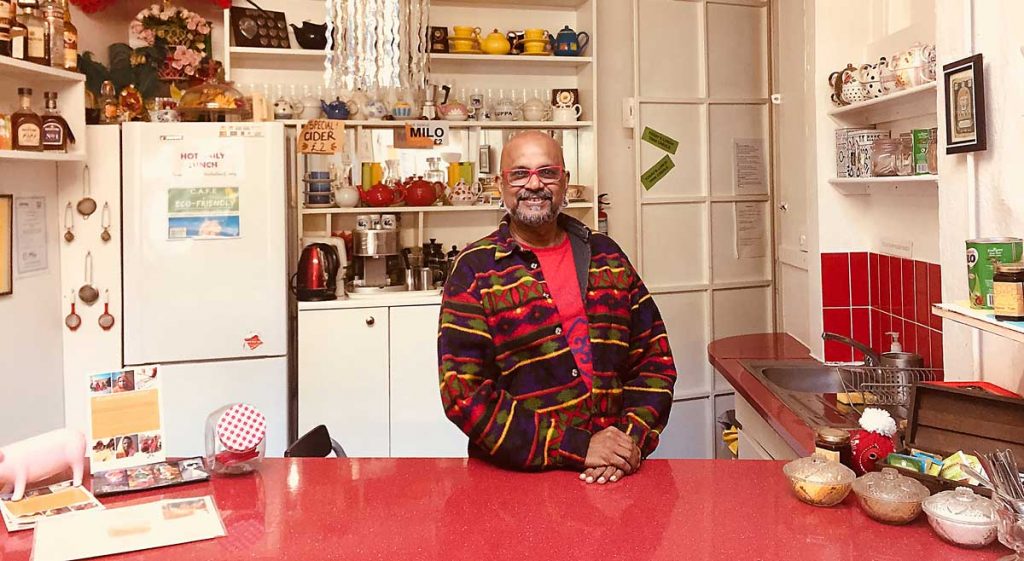As Carnival approaches, Steve Powdrill meets a man with a mission to make it sustainable as well as stunning

Fun, frivolity, bright colours and excess usually come to mind when we think of Notting Hill Carnival
Saving the planet? Not so high on the list. Brixton-based Ray Mahabir, founder of Sunshine International Arts (SiA), isn’t too happy about this. “I’m a namer and shamer!” He laughs mischievously, as we sit amongst some of his creations – gigantic feathery head-dresses, glistening tribal masks, picture collages celebrating carnivals that came before. “I tweet supermarkets that aren’t being eco-friendly!”
We’re in the main space of SiA, where many of Notting Hill’s costumes are brought to life, and which (Mahabir is pleased to inform me) became an eco-friendly workspace last year. Creating carnival-wear with the environment in mind is no small task. Plastic-containing beads, glitter and polyester are all important materials used to make an extravagant costume pop.
Many costumes are bought as weekend one-offs and, due to the complexity of their designs, are notoriously difficult to recycle. Mahabir tells me he has a solution. Leading me to a large room, he demonstrates with a flourish, where a selection of costumes from the previous ten years of NHC are laid out across the floor like unwrapped gifts. “We’re going to upcycle them!” Using a feather here and a sequin there, SiA’s 2019 carnival band will be showcasing a range of redesigned costumes using old materials, in hope that onlookers might take inspiration from their eco-friendly stance.
Many of these will be created at “MasCamp”, a summer-long workshop course at SiA, which will cover the range of design skills needed to make a first-class, eco-friendly costume. While a colourful co-ord and all the accessories could set you back hundreds on the high street, Mahabir hopes that upcycling at MasCamp will allow well-tailored carnival-wear to be accessible to everyone this year. “People will come after work, after school, people who wouldn’t usually afford to buy materials … we want people on a low income to still be able to get involved in the art of carnival.”
Whilst Mahabir prides himself on high-quality work, the social aspect of the workshops seems just as valuable as the end-product. “MasCamp is about community coming together, working together. It’s about the conversations happening around the table, while we’re sticking glue. I don’t want a life where we depend on trained artists too much.” Mahabir is in earnest about community. Having been involved in UK carnival and festival production for the last 20 years, he is well aware of the good that inclusion and celebration can do for neglected members of society.
Indeed, even SiA’s motto speaks volumes – “The Art of People”. For Mahabir, making do with what you’ve got seems to be his vision on making a difference in carnival – everyday people, places and things transformed into something extraordinary. SiA is a difficult organisation to sum up because they just do so much. Costumes aside, the centre functions as a licensed charity, a Trinidadian lunch-time café, a second-hand shop of curious objects from around the world, as well as offering various spaces in the building to rent for rehearsals and more. “We also make our own jam …” Mahabir offers, and I throw away my pen.
Funds raised by SiA contribute to the charity’s outreach programmes in India and, more recently, Kenya where carnival-based workshops are run for disadvantaged children with limited access to education. The goal of the “Reach the Unreachable” programme, running since 2015, is to empower these young people to express themselves through art and create the foundations of a legacy in carnival arts. Despite the momentum SiA has built over the years, running a charity does not come without its difficulties.
Arts funding across the country has suffered nearly £400m worth of cuts in the last eight years of Conservative government, and some local arts organisations have had to drop out of projects they would usually collaborate on with SiA. On top of this, closures of shops in central Brixton’s railway arches have given Mahabir and the SiA team cause for concern. “It really shook everyone here to see all of Brixton’s arches being shut down. It just feels inevitable that at some point this may spread to Loughborough Junction, where we are.”
Closure of the site would prove extremely tricky for the team; the vast number of costumes in storage would be hard to relocate. Mahabir tells me that, after talking to me, he’s got to drop off a costume with a client. It’s a five-foot wide, swan-like top piece, with spreading wings and delicate, ultra-white feathers. “I’m taking it with me on the Victoria Line,” he announces to my horror. How will you get it through the doors? Mahabir notes my expression with amusement. “Oh, just like this,” he says, propping the frame of the piece onto his shoulder in a cheerful, hey-ho sort of way. I shouldn’t be too surprised.
If I’ve learnt anything from my visit, it is that a positive attitude and a thrifty sense of adventure are what carnival spirit is truly all about. With MasCamp at SiA fast approaching, visit the SiA website at www.sunshineiarts.co.uk for more information on how to join in. Classes will cover everything from head-dress building to feather flowing and anyone is welcome to join in on the fun.
Sunshine Arts’ Top Tips for going Green at Carnival
- Carry a reusable water bottle. Glastonbury music festival calculated that, in 2017, over 1 million plastic water bottles were used over the weekend’s events, and Notting Hill Carnival can’t be that much better.
- Clothes swap with friends. This is a great way to wear something that feels new and fresh at this year’s festivities, without buying a needless, one-off costume.
- Avoid glitter … jazz up your outfit with face or body paint, or get plastic-free glitter, which is naturally derived from plants.
- Carry a bag for your rubbish in. Some 300 million tonnes of waste ends up on the street at Notting Hill Carnival each year.
- Bring a bio-degradable ashtray. At the end of the day, just throw the ashtray in the nearest recycling. They can be bought online from carnival/festival suppliers.
















